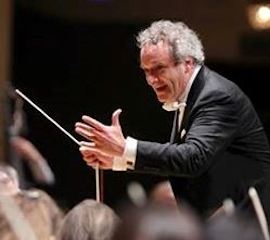If you don’t attend another
Cincinnati Symphony Orchestra concert this season, don’t miss this weekend’s Mahler
Symphony No. 1 at Music Hall.

Centerpiece of this year’s “One City, One Symphony” project, Gustav Mahler’s “Titan” Symphony received a resplendent reading by music director Louis Langrée and the CSO Friday morning at Music Hall.
Theme of 2014’s “One City, One Symphony” concert (the project was begun in 2012 when Langrée was music director-designate) was heroes, and the spirit, substance and thrill of that word were fully expressed in the CSO’s performance.
In this reviewer’s experience of rather many Mahler Firsts, I have never heard a finer one.
Also on the concert – the culmination of a series of neighborhood “listening parties” begun in October-- were two other “heroic” works, the “Coriolan” Overture by Beethoven and French composer Albérich Magnard’s “Hymne à la justice” (1901-02) in its CSO premiere.
Written in response to France’s notorious Dreyfuss Affair – a case in which a Jewish army officer was falsely accused of treason – Magnard’s 15-minute work brimmed with drama. Langreée and the CSO opened full bore, with the emphatic three-note motif introducing the main theme. The second theme, for clarinet solo with tremolo strings and harp, made an ethereal contrast. After much angst, the Hymne came to a triumphant climax, sealed by a warm, harp-laced conclusion (compliments throughout to harpist Gillian Benet Sella).
The hero of Mahler’s Symphony No. 1 is the composer himself. Langrée laid it out masterfully, with scrupulous attention to detail and astonishing transparency. The faraway introduction emerged magically, with birdcalls, offstage trumpets and the tender cello theme. Following a majestic horn fanfare, it seemed to wallow in pure joy.
The dance-like second movement had a wonderful, brassy glow. The third movement unfolded in perfect order and hue, beginning with principal bassist Owen Lee’s opening statement of the somber “Frère Jacques” theme. There was plenty of color throughout, from the “drunken” dance-like episode for oboes and trumpets, to the sly little counter theme for strings, to the deceptively soft conclusion, which sets up the finale.
Beginning with its famously sudden outburst, the finale was deeply felt and immensely detailed. The ever-so-gentle subordinate theme grew luscious in Langrée’s hands. (Throughout the Symphony, Langrée was able to craft both the softest softs and fortes that filled every crevice of Music Hall.) The final coda was like a blazing sun upon the water, with the entire horn section standing.
Beethoven’s concert overture, which celebrates the Roman hero Coriolanus, was the perfect opener for the concert, doubly effective in both its heroic and touching moments.
The concert repeats at 8 p.m. Saturday, 2 p.m. Sunday at Music Hall. Note: Sunday’s matinee – in effect a “listening party” -- will comprise the Mahler Symphony only (excluding the Beethoven and Magnard works), with explanatory remarks by Langrée and musical examples by the CSO.
Tickets begin at $12. Call (513) 381-3300, or visit w.w.w.cincinnatisymphony.org